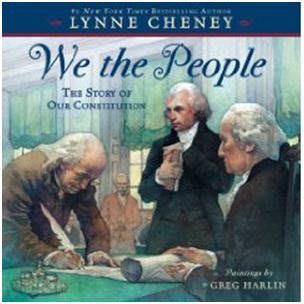 We the People
We the People
The Story of Our Constitution
by Lynn Cheney, paintings by Greg Harlin
It is hard for us not to idealize the founding fathers. It is hard for us to put ourselves in their frame of mind. We know that the Republic endured. We know that the peaceful transfer of executive power has been faithfully observed for 220 years across the administrations of 43 presidents. The authors of the constitution were, in fact, embarking on a great experiment in government. Since the overthrow of the Roman Republic in 44 BC, no nation had been able to govern itself without kings, nobles, or warlords. By 1787, six years after Yorktown, and four years after the peace treaty signed with Great Britain, the confederation of former English colonies in North America was failing.
Here is the remarkable introduction by Lynne Cheney:
“When 1787 began, our young country was in turmoil. The central government was unable to pay off debts, there was armed insurrection in Massachusetts, and foreign governments were taking advantage of our weakness. The question of the hour, James Madison wrote, was ‘whether the American experiment was to be a blessing to the world or to blast forever the hopes which the republican cause had inspired.’
The framers of the Constitution made it a blessing, creating a new and stronger American union and flying in the face of prevailing wisdom as they did so. In the eighteenth century, representative government in a nation of vast scale was thought impossible, a recipe for chaos and confusion; but an extended republic based on popular sovereignty was exactly what the Constitution created in Philadelphia in the summer of 1787 envisaged. The government based upon it has now endured more than 220 years.
The story of our founding document is an important one for our children to know. It is a tale of persistence, as delegates kept on despite obstacles that at times made their task seem impossible. It is a tale of creativity, with the delegates providing a framework for a government entirely new. It is also a story that makes clear there was nothing inevitable about the Constitution that emerged from the Philadelphia convention. History might have gone otherwise but for the framers’ genius, and we should be grateful for James Madison, George Washington, Benjamin Franklin, and the others who gathered in Philadelphia. We should be grateful as well for men and women such as Frederick Douglass, Elizabeth Cady Stanton, and Martin Luther King Jr., who in later centuries took up the work of the founders, making the union formed in 1787 the more perfect one we know today.”
Cheney tells the story in a simple, straight-forward style. The proposal to separate the powers of government into three branches, the fierce debate and compromise over equal votes for each state or proportional representation in the legislative assembly; the call for a chaplain and prayer made by Franklin; and the debate over who would ratify the Constitution. The text has a quotation from a founder on almost every page that provides further insight into the issues. The paintings focus on the characters of the delegates. Gestures, glances, frowns, and extravagant gestures help the reader to understand the fierceness of the debates. There is a marvelous painting on one page of Washington taking the day off to go fishing and another that shows Franklin entertaining visitors in his garden.
The text overall is middle to upper elementary. The large illustrations will capture the attention of younger children if the text is read to them.
We the People by Lynne Cheney is a hardback, 40 pages, full color, $17.99 directly from Greenleaf Press.
– Rob Shearer
Publisher, Greenleaf Press
Director, Schaeffer Study Center